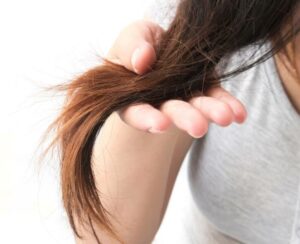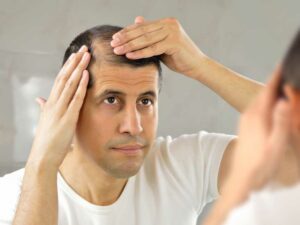 There are many causes of hair loss and everyone’s hair loss is different. However, ingredients like tea tree oil can help fight the issue directly from the roots. Applying tea tree oil to the hair and scalp can have an effective result for various types of hair loss including hereditary, external and medical causes. This particular type of oil is obtained from the leaves of the Melaleuca Alternifolia plant which can be found in the northeast coast of New South Wales, Australia. For many years, native aborigines have used tea tree oil to treat skin ailments such as fungal infections, burns, cuts and acne. Used as an antiseptic, antibacterial, as well as an anti-fungal, tea tree oil also has the ability to encourage healthy hair and scalp by unclogging the hair follicles from excess oil, reducing dandruff and stimulating blood flow within the scalp.
There are many causes of hair loss and everyone’s hair loss is different. However, ingredients like tea tree oil can help fight the issue directly from the roots. Applying tea tree oil to the hair and scalp can have an effective result for various types of hair loss including hereditary, external and medical causes. This particular type of oil is obtained from the leaves of the Melaleuca Alternifolia plant which can be found in the northeast coast of New South Wales, Australia. For many years, native aborigines have used tea tree oil to treat skin ailments such as fungal infections, burns, cuts and acne. Used as an antiseptic, antibacterial, as well as an anti-fungal, tea tree oil also has the ability to encourage healthy hair and scalp by unclogging the hair follicles from excess oil, reducing dandruff and stimulating blood flow within the scalp.
Unclogs Hair Follicles
Hair grows from little pouches beneath the skin which are known as hair follicles. When hair follicles become clogged, they are unable to continue to produce strong hair strands. Many who experience hair loss, also have build up on the scalp such as excess oil/sebum, which furthers the problem of hair fall. Sebum is an oily substance that is produced on the scalp and when it is overproduced, the hair follicles can become clogged with hardened sebum resulting in weak and undernourished hair strands. This is when tea tree oil comes into play. Tea tree oil has the ability to dissolve the hardened sebum, freeing the follicle for healthy hair growth.
Reduces Dandruff
Tea tree oil also reduces other build up on the scalp by removing bacteria and fungi which helps alleviate dandruff and other related skin ailments like psoriasis and seborrheic dermatitis. Tea tree oil is similar to the popular hair loss ingredient, Ketoconazole, as both are considered anti-fungals which help to eliminate scaly and itchy dry patches on the skin. Studies have also shown that tea tree oil has the ability to improve the immune system which helps to combat infections that can result in hair loss. While dandruff may just seem like an aesthetically unpleasing nuisance, if left untreated, the dead skin that then formulates on the scalp can negatively effect the hair follicles, making tea tree oil a great solution to combat such issues.
Stimulates Blood Flow
Massaging tea tree oil into the scalp can help increase the blood flow while reducing inflammation. When the scalp is deprived of stimulation, the hair follicles do not receive an adequate amount of blood flow, which they need in order to thrive and produce healthy hair strands. In fact, a study revealed that men who were experiencing androgenic alopecia and hair loss had significantly less blood flow to their scalps, than men who were not experiencing hair loss.
There are many ways to stimulate the blood circulation within the scalp, including making your own tea tree oil treatment. When deciding to make a home remedy tea tree oil treatment it is important to dilute the tea tree oil as it is very strong on its own and can result in irritation, especially for those with sensitive skin. You can dilute the oil by mixing 1 part tea tree oil with 10 parts of any other oil like almond or jojoba oil. Or you can always opt for an over the counter shampoo or sulfate-free conditioner that contains tea tree oil and other beneficial ingredients.
IMPORTANT: Tea tree oil should NEVER be ingested, as it is considered toxic when taken orally.





